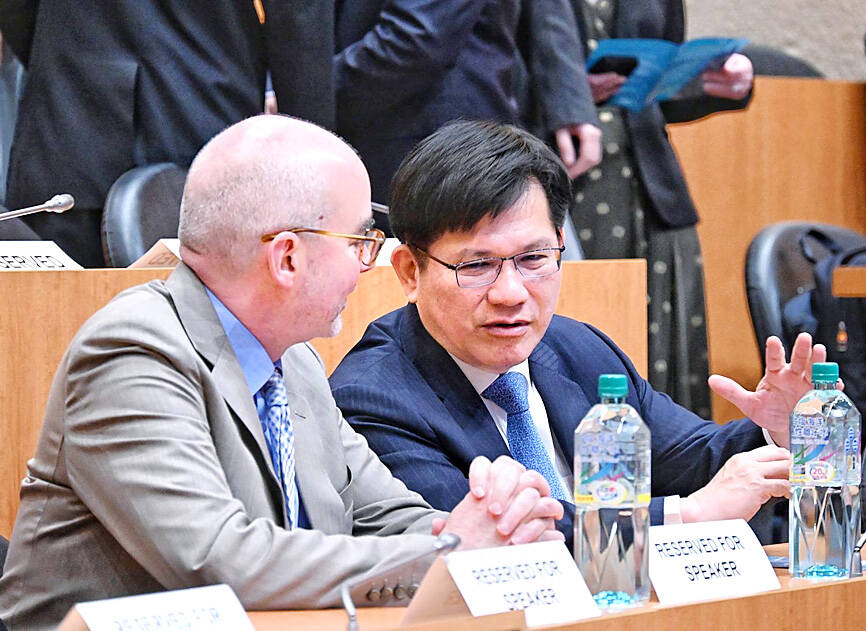American Institute in Taiwan (AIT) Director Raymond Greene yesterday reiterated that the US stands with its allies and partners in the Indo-Pacific region, adding that cooperation is more critical than ever.
Greene made the comments during his congratulatory remarks at the “Taiwan Forward: Driving Modernization Amid Shifting Global Dynamics” conference at National Taiwan University (NTU) in Taipei.
“The United States stands strong with our allies and partners in the Indo-Pacific,” he said. “We’re taking decisive actions to counter threats against economic resilience and advanced shared interests.”

Photo: Fang Pin-chao, Taipei Times
“Our cooperation is more critical than ever,” he said, adding that it makes “the US, Taiwan and all of our regional allies safer, stronger and more prosperous,” referring to remarks by the Minister of Foreign Affairs Lin Chia-lung (林佳龍).
While many countries have recognized Taiwan as a beacon of universal values and support the nation’s resilience and international participation, it has also in the past decade significantly reduced its investments in China, moving them to like-minded democratic countries, Greene said.
However, Taiwan still faces challenges, such as leading in artificial intelligence (AI), but falling behind in software development, which is partially due to reasonable concerns over China’s infiltration of Chinese-language large language models, he said.

Photo: Fang Pin-chao, Taipei Times
Greene also addressed the nation’s security “in the face of a relentlessly aggressive China that is using the full range of military, economic and diplomatic tools against Taiwan.”
“The United States has a stake in these questions and in Taiwan’s success,” he said, adding that the US and Taiwan are leading partners in advanced technology development, while the number of Taiwanese students studying in the US is growing and Taiwan is the US’ seventh-largest trading partner.
“Maintaining the status quo in the Taiwan Strait is critical for the United States and the entire world,” the AIT director said.
Citing comments by US Secretary of State Marco Rubio, Greene said the US has a long-standing position on Taiwan that it would not abandon, which is that “we are against any forced, compelled, coercive change in the status of Taiwan.”
“The challenges Taiwan faces are not only challenges for Taiwan, but for the United States, and the entire world,” he said. “A strong, resilient Taiwan, and a stable and peaceful Indo-Pacific are the foundations of modernization.”
The conference — organized by the Taiwan Program at Stanford University’s Walter H. Shorenstein Asia-Pacific Research Center and cosponsored by NTU’s Office of International Affairs — featured panel discussions with academics from Stanford University, NTU and other universities in Taiwan, Japan, South Korea and Singapore, alongside Taiwanese industry leaders, on topics ranging from AI innovation and semiconductor, entrepreneurship, biomedical and healthcare advancements, and Taiwan’s demographic transformation.
Additional reporting by CNA

DAREDEVIL: Honnold said it had always been a dream of his to climb Taipei 101, while a Netflix producer said the skyscraper was ‘a real icon of this country’ US climber Alex Honnold yesterday took on Taiwan’s tallest building, becoming the first person to scale Taipei 101 without a rope, harness or safety net. Hundreds of spectators gathered at the base of the 101-story skyscraper to watch Honnold, 40, embark on his daredevil feat, which was also broadcast live on Netflix. Dressed in a red T-shirt and yellow custom-made climbing shoes, Honnold swiftly moved up the southeast face of the glass and steel building. At one point, he stepped onto a platform midway up to wave down at fans and onlookers who were taking photos. People watching from inside

A Vietnamese migrant worker yesterday won NT$12 million (US$379,627) on a Lunar New Year scratch card in Kaohsiung as part of Taiwan Lottery Co’s (台灣彩券) “NT$12 Million Grand Fortune” (1200萬大吉利) game. The man was the first top-prize winner of the new game launched on Jan. 6 to mark the Lunar New Year. Three Vietnamese migrant workers visited a Taiwan Lottery shop on Xinyue Street in Kaohsiung’s Gangshan District (崗山), a store representative said. The player bought multiple tickets and, after winning nothing, held the final lottery ticket in one hand and rubbed the store’s statue of the Maitreya Buddha’s belly with the other,

‘NATO-PLUS’: ‘Our strategic partners in the Indo-Pacific are facing increasing aggression by the Chinese Communist Party,’ US Representative Rob Wittman said The US House of Representatives on Monday released its version of the Consolidated Appropriations Act, which includes US$1.15 billion to support security cooperation with Taiwan. The omnibus act, covering US$1.2 trillion of spending, allocates US$1 billion for the Taiwan Security Cooperation Initiative, as well as US$150 million for the replacement of defense articles and reimbursement of defense services provided to Taiwan. The fund allocations were based on the US National Defense Authorization Act for fiscal 2026 that was passed by the US Congress last month and authorized up to US$1 billion to the US Defense Security Cooperation Agency in support of the

‘COMMITTED TO DETERRENCE’: Washington would stand by its allies, but it can only help as much as countries help themselves, Raymond Greene said The US is committed to deterrence in the first island chain, but it should not bear the burden alone, as “freedom is not free,” American Institute in Taiwan Director Raymond Greene said in a speech at the Institute for National Defense and Security Research’s “Strengthening Resilience: Defense as the Engine of Development” seminar in Taipei yesterday. In the speech, titled “Investing Together and a Secure and Prosperous Future,” Greene highlighted the contributions of US President Donald Trump’s administration to Taiwan’s defense efforts, including the establishment of supply chains for drones and autonomous systems, offers of security assistance and the expansion of